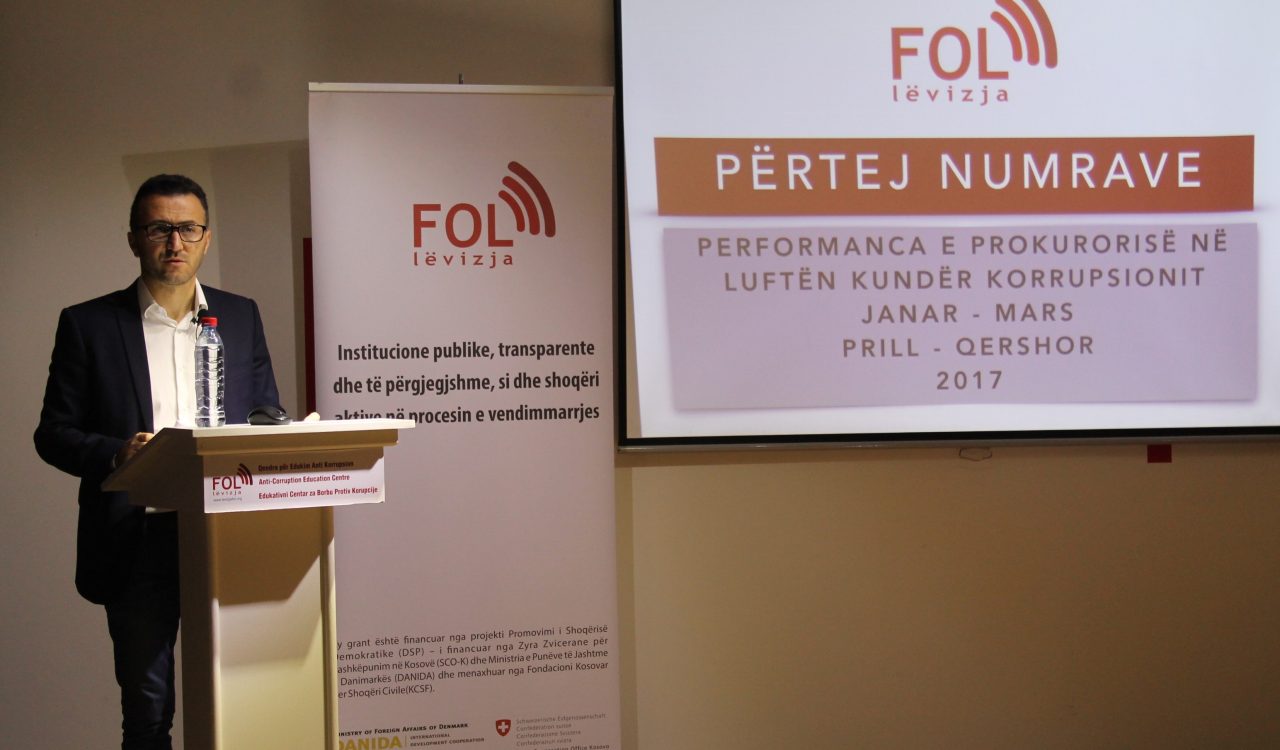Beyond the Number – Prosecution Performance in the Fight Against Corruption for January-June 2017
Prishtina, 15 September 2017 – Lëvizja FOL held a press conference where it presented the anti-corruption statistics of the Basic Prosecutions and Special Prosecution Office. Jeton Zulfaj from Lëvizja FOL said that the data presented are statistics for the period January-March as well as April-June for 2017. According to him, the statistics are official and have been received by the Kosovo Prosecutorial Council. “These data were taken from the group of criminal offenses: ‘Official Corruption and Offenses against Officials, Articles 422 – 437, Chapter XXXIV of the Criminal Code of Kosovo’. Meanwhile, measuring the efficiency of the Prosecution in the field of counter-corruption has been done mainly relying on the methodology used by the European Commission on Efficiency of Justice but also in other methods, “Zulfaj said. According to him, the work of the Prosecution is mainly measured by persons and that the measurements do not indicate the quality of the cases and the quality of the work of prosecutors.
The flow of anti-corruption cases at the national level for the period January-March is: unsolved cases 1151, new cases 203, cases at work 1354, solved cases 228, unsolved cases – 1126. Meanwhile for the period April-June are: unsolved 1083, new cases 160, cases at work 1243, solved cases 271, unsolved cases 972.
The case resolution rate is an indicator of the performance of the Prosecutor’s Office. Based on the performance for the first quarter of 2017, it appears that the Prosecution has worked effectively above 100% at the central level, the case resolution for the first three months is 112%, while for the period April to June it is 169 %.
While the disposition time at the national level stands at 450 days for the period January-March. Meanwhile, for April – June is 333 days. Regarding the index of cases that shows us the nationally collected cases, the index stands at 5.0 for the first three months, and 4.0 for the third quarter.
“Fields in which FOL measures the performance of the Prosecution are: case flow, case resolution rate, case turnover rate, case resolution trend, disposition time and backlog index,” said Zulfaj .
Meanwhile regarding the findings for the Basic Prosecutions, Zulfaj said that “Pristina’s Basic Prosecution has the largest number of transfered cases for January-March, which are 595, has received 102, and has resolved 28. Similar performance has indicated the Basic Prosecution of Prishtina for the second trimester, where it has inherited 574 cases, 71 has accepted as new and has 114 “.
The Basic Prosecution of Ferizaj with the Basic Prosecutor of Prizren has the best case resolution for the period January-March 2017 with PTHF = 200% PTHP = 177%, meanwhile poor performance during this period have shown Mitrovica and Prishtina PTHM = 41 % PTHP = 27%. In the second three months, Mitrovica Basic Prosecution has the highest case resolution rate of 470%, while the Special Prosecution Office has the lowest of 90%.
Based on the trend, the Basic Prosecution of Prizren and the Basic Prosecution of Ferizaj are expected to level the cases in the next five years, while the Basic Prosecution of Peja for 32 years. Meanwhile for the period April – June, the Basic Prosecution of Gjakova is expected to level the courses in the next 4 years.
The time to resolve the cases shows that Mitrovica is the worst for the first three months after the prosecution there receives 4500 days for dealing with cases (persons) escorted by Pristina’s Basic Prosecution with 2250 days. Regarding the second three months of this year, the Special Prosecution takes 1000 days to handle cases for persons, while Pristina receives 428 days.
* Clarification: The work of the Prosecution is mainly measured by persons and that this measurement does not indicate the quality of cases and the quality of the prosecutors’ work, the quality of the administration service or the integrity and professionalism of prosecutors.
* Statistics are official statistics published by Kosovo Prosecutorial Council. In some cases, the number of separate prosecution cases does not reflect the total number of cases at the central level. These inaccuracies in numbers should be addressed to the Kosovo Prosecutorial Council.
This grant is funded by the Democratic Society Promotion (DSP) project – funded by the Swiss Cooperation Office in Kosovo (SCO-K) and the Danish Ministry of Foreign Affairs (DANIDA) and managed by the Kosovo Civil Society Foundation (KCSF).
